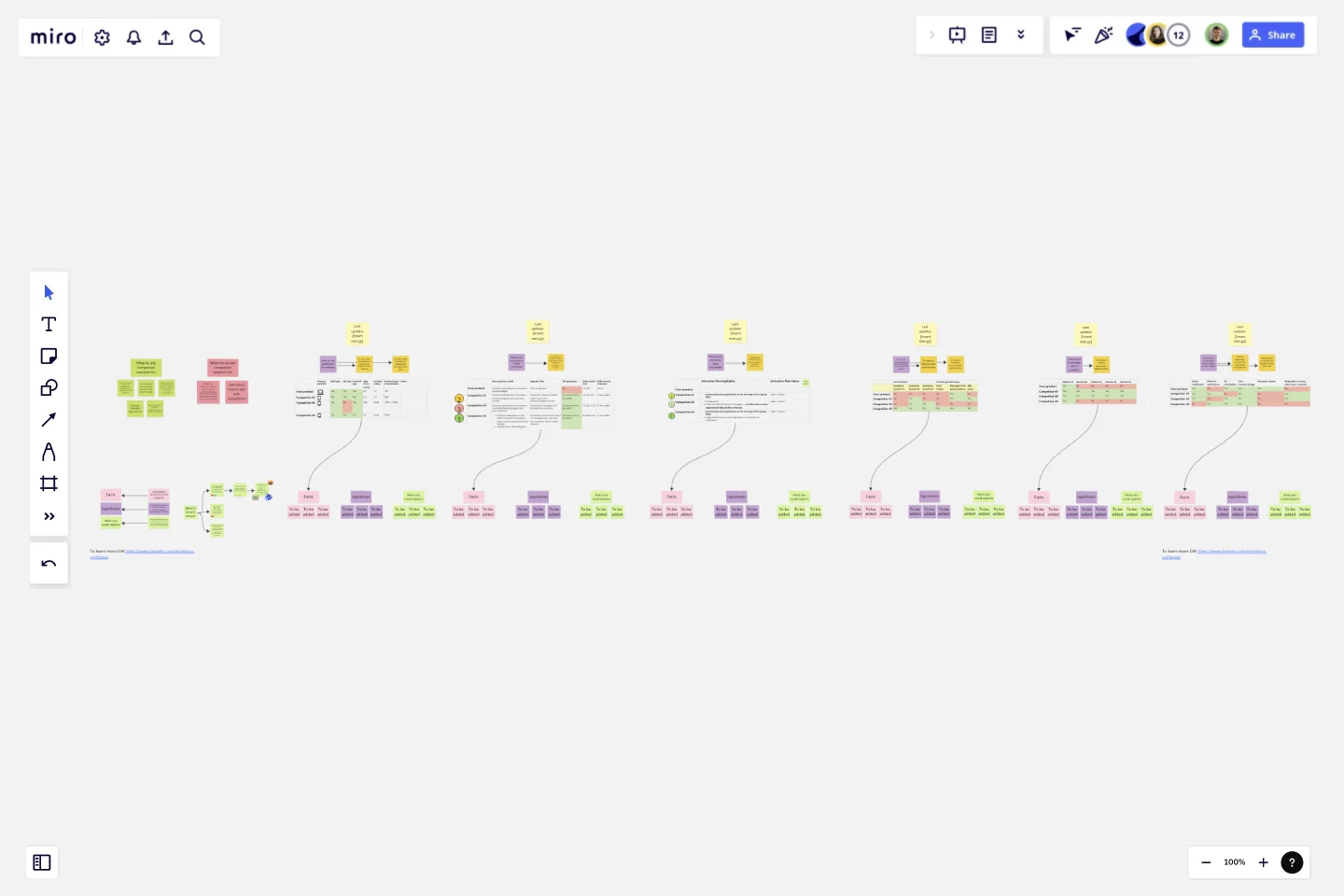Competitor Product Research
Actionable business-model and customer-benefits-driven competitor product research.
This format allows you to discover untapped opportunities and generate informed product and growth hypotheses.
Competitor product research yields the most results not when it's based on feature comparison tables, but when the facts uncovered feed the hypotheses bank that ideally go through additional validation. Check out the template to know more.
This template was created by Milena Ryzhkova.
Get started with this template right now.
Brainwriting Template
Works best for:
Education, Ideation, Brainstorming
Brainstorming is such a big part of ideation. But not everyone does their best work out loud and on the spot, yelling out thoughts and building on others’ ideas. Brainwriting is a brilliant solution for them—creative thinkers who happen to be more introverted. This approach and template invites participants to reflect quietly and write out their ideas, and then pass them to someone else who will read the idea and add to it. So you’ll get creative ideas from everyone—not just the loudest few.
Product Discovery Kick Off Workshop
Works best for:
Product Managament, Planning
The Product Discovery Kick Off Workshop template accelerates the start of product discovery initiatives. By facilitating collaborative workshops, defining objectives, and establishing timelines, this template ensures that product discovery efforts are structured and focused. With sections for defining user personas, articulating problem statements, and setting success criteria, it guides teams through the initial stages of product discovery, laying the foundation for successful product development. This template serves as a catalyst for aligning teams and kick-starting product innovation journeys.
Product Hypothesis Canvas
Works best for:
Product Management, Planning
The Product Hypothesis Canvas template assists product teams in formulating and testing hypotheses effectively. By defining assumptions, success metrics, and validation experiments, this template guides teams through the hypothesis validation process. With sections for articulating problem statements, proposed solutions, and expected outcomes, it ensures that hypotheses are clear, testable, and aligned with strategic objectives. This template serves as a framework for hypothesis-driven product development, enabling teams to validate ideas and make data-informed decisions.
Go-to-Market GTM Template | Miro
Works best for:
Marketing, Desk Research, Strategic Planning
It doesn’t matter how innovative or effective a new product is — if it doesn’t get noticed and adopted by the right audience, the product won’t get off the ground. That’s where your Go-to-Market Strategy comes in. It’s a single resource that houses all of your research, insights, and data, and includes your business plan, target audience, marketing approach, and sales strategy. A GTM is especially important for any startups who grow fast, have to make split-second decisions, and have to be fully in sync.
Idea Funnel Backlog
Works best for:
Design, Brainstorming, Agile Workflows
An Idea Funnel Backlog enables you to visualize your backlog and restrict the number of backlogged items at the top. In doing sos, you can prioritize items on your list without having to engage in unnecessary meetings or create too much operational overhead. To use the Idea Funnel Backlog, break up the funnel into different phases or treat it like a roadmap. Use the Idea Funnel Backlog as a hybrid model that combines your roadmap and backlog into one easily digestible format.
Event Planning Template
Works best for:
Planning, Workshops
Whether you’re planning a product launch, fully remote conference, or milestone event, the Event Planning Template will act as a visual checklist and map for all the details you need to consider before the big day. The Event Planning Template is an adaptable way to make sure the creative and strategic vision of your event doesn’t get lost in the details. By mapping out different sections - from the marketing plan, to the agenda, to snacks and swag for guests — you and your team can focus on the details most important to your functions, and collaborate as needed when overlaps occur.
